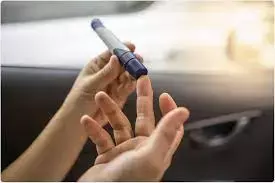- Home
- Medical news & Guidelines
- Anesthesiology
- Cardiology and CTVS
- Critical Care
- Dentistry
- Dermatology
- Diabetes and Endocrinology
- ENT
- Gastroenterology
- Medicine
- Nephrology
- Neurology
- Obstretics-Gynaecology
- Oncology
- Ophthalmology
- Orthopaedics
- Pediatrics-Neonatology
- Psychiatry
- Pulmonology
- Radiology
- Surgery
- Urology
- Laboratory Medicine
- Diet
- Nursing
- Paramedical
- Physiotherapy
- Health news
- Fact Check
- Bone Health Fact Check
- Brain Health Fact Check
- Cancer Related Fact Check
- Child Care Fact Check
- Dental and oral health fact check
- Diabetes and metabolic health fact check
- Diet and Nutrition Fact Check
- Eye and ENT Care Fact Check
- Fitness fact check
- Gut health fact check
- Heart health fact check
- Kidney health fact check
- Medical education fact check
- Men's health fact check
- Respiratory fact check
- Skin and hair care fact check
- Vaccine and Immunization fact check
- Women's health fact check
- AYUSH
- State News
- Andaman and Nicobar Islands
- Andhra Pradesh
- Arunachal Pradesh
- Assam
- Bihar
- Chandigarh
- Chattisgarh
- Dadra and Nagar Haveli
- Daman and Diu
- Delhi
- Goa
- Gujarat
- Haryana
- Himachal Pradesh
- Jammu & Kashmir
- Jharkhand
- Karnataka
- Kerala
- Ladakh
- Lakshadweep
- Madhya Pradesh
- Maharashtra
- Manipur
- Meghalaya
- Mizoram
- Nagaland
- Odisha
- Puducherry
- Punjab
- Rajasthan
- Sikkim
- Tamil Nadu
- Telangana
- Tripura
- Uttar Pradesh
- Uttrakhand
- West Bengal
- Medical Education
- Industry
Admission blood sugar independent predictor of coagulopathy in multiple Trauma Patients, finds study

Admission blood sugar independent predictor of coagulopathy finds study published in the European Journal of Trauma and Emergency Surgery
Coagulopathy is prevalent in multiple trauma patients and worsens bleeding complications, leading to higher morbidity and mortality rates. Hyperglycemia upon admission predicts hemorrhagic shock and mortality in severely injured patients. This study aimed to assess admission glucose levels as an independent prognostic factor for coagulopathy in multiple injured patients. This retrospective cohort study observed multiple trauma patients treated at a level I trauma center between January 1, 2005, and December 31, 2020. Coagulopathy was defined as an international normalized ratio (INR) > 1.4 and/or activated thromboplastin time (APTT) > 40 s. Analysis of variance compared clinical and laboratory parameters of patients with and without coagulopathy. Receiver-operating-characteristic (ROC) and multivariate logistic regression analyses identified risk factors associated with coagulopathy. RESULTS: The study included 913 patients, of whom 188 (20%) had coagulopathy at admission.
Coagulopathy patients had higher mortality than those without (26% vs. 5.0%, p < 0.001). The mean glucose level in coagulopathy patients was 10.09 mmol/L, significantly higher than 7.97 mmol/L in non-coagulopathy patients (p < 0.001). Admission glucose showed an area under the curve (AUC) of 0.64 (95% CI [0.59-0.69], p < 0.001) with an optimal cut-off point of 12.35 mmol/L. After adjusting for other factors, patients with high admission glucose had a 1.99-fold risk of developing coagulopathy (95% CI 1.07-3.60). Other laboratory parameters associated with coagulopathy included haemoglobin, bicarbonate (HCO3), and lactate levels. This study emphasizes the significance of admission blood glucose as an independent predictor of coagulopathy. Monitoring hyperglycemia can aid in identifying high-risk patients.
Reference:
Mayor, Jorge, et al. "Do Admission Glucose Levels Independently Predict Coagulopathy in Multiple Trauma Patients? A Retrospective Cohort Analysis." European Journal of Trauma and Emergency Surgery : Official Publication of the European Trauma Society, 2024.
Dr. Shravani Dali has completed her BDS from Pravara institute of medical sciences, loni. Following which she extensively worked in the healthcare sector for 2+ years. She has been actively involved in writing blogs in field of health and wellness. Currently she is pursuing her Masters of public health-health administration from Tata institute of social sciences. She can be contacted at editorial@medicaldialogues.in.
Dr Kamal Kant Kohli-MBBS, DTCD- a chest specialist with more than 30 years of practice and a flair for writing clinical articles, Dr Kamal Kant Kohli joined Medical Dialogues as a Chief Editor of Medical News. Besides writing articles, as an editor, he proofreads and verifies all the medical content published on Medical Dialogues including those coming from journals, studies,medical conferences,guidelines etc. Email: drkohli@medicaldialogues.in. Contact no. 011-43720751


